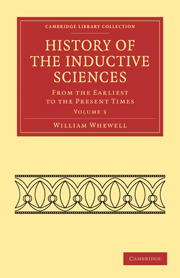
-
Select format
-
- Publisher:
- Cambridge University Press
- Publication date:
- September 2011
- September 2010
- ISBN:
- 9780511734359
- 9781108019262
- Dimensions:
- Weight & Pages:
- Dimensions:
- (216 x 140 mm)
- Weight & Pages:
- 0.81kg, 642 Pages
You may already have access via personal or institutional login
Book description
A central figure in Victorian science, William Whewell (1794–1866) held professorships in Mineralogy and Moral Philosophy at Trinity College, Cambridge, before becoming Master of the college in 1841. His mathematical textbooks, such as A Treatise on Dynamics (1823), were instrumental in bringing French analytical methods into British science. This three-volume history, first published in 1837, is one of Whewell's most famous works. Taking the 'acute, but fruitless, essays of Greek philosophy' as a starting point, it provides a history of the physical sciences that culminates with the mechanics, astronomy, and chemistry of 'modern times'. Volume 3 first covers the mechanico-chemical sciences, emphasizing the convergence of mechanical and chemical theories in discoveries pertaining to electricity, magnetism and thermodynamics. A section on chemistry surveys Becher and Stahl's phlogiston theory, Lavoisier's theory of oxygen, and Faraday's laws of electromagnetic induction. The volume also covers mineralogy, botany, zoology, and anatomy.
Contents
Metrics
Altmetric attention score
Full text views
Full text views help Loading metrics...
Loading metrics...
* Views captured on Cambridge Core between #date#. This data will be updated every 24 hours.
Usage data cannot currently be displayed.
Accessibility standard: Unknown
Why this information is here
This section outlines the accessibility features of this content - including support for screen readers, full keyboard navigation and high-contrast display options. This may not be relevant for you.
Accessibility Information
Accessibility compliance for the PDF of this book is currently unknown and may be updated in the future.


